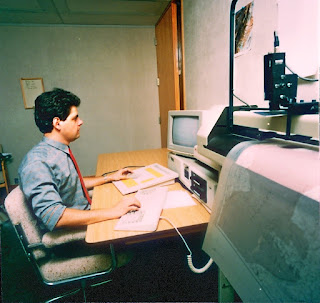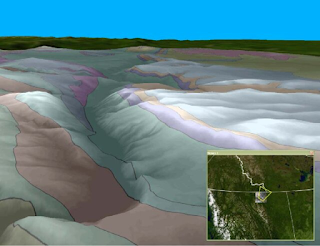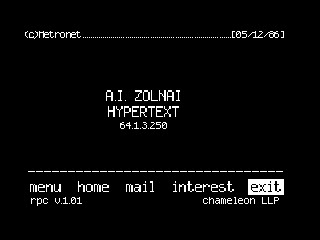Update 2: see my journey on the web here.
Update 1: a duo of posts on my Medium professional channel here relates my early computing.
As I go through a 'hard reset' in my life and plan to exit social media, this may be a good time to pause and reflect on my IT journey.
 |
| Calgary 1986 see here |
Although I started on mainframes at Univ. of Calgary 1979 (
here), I transitioned to desktop at Queen's Univ. (
here). That post's intro lists articles illustrating the progression from geology to computer mapping and GIS. The reason I was able to do that, is that my eight years of high-school Latin allowed me to read, fix and re-run Unix scripts running petrodata management software in the oil industry, where I spent the bulk of my career.
That then prepared me for HTML coding in the early pre-Internet days... This was 1986, 3 yrs. before Tim Berners-Lee ushered in the World Wide Web! The City of Calgary in W CAN was optically wired by the then government telephone co. AGT (now Telus) for free, betting on the fact they'd recoup the money - and they did so handsomely - via the traffic of all the oil companies jammed downtown. This was against a backdrop of the Province of Alberta having forward-looking Land Information System based in the capital Edmonton a couple hours drive north (
here), but that was the heyday of early data transmission protocols (
rpc) and open binary data (
EBCDIC) that opened the data flow cross province on said optical network.
Anecdote 1: as an undergrad at University of Calgary, I learned of Ted Nelson's Xanadu project (here), to catalog the world's information via what later became Hypertext Markup Language (HTML) - few people realise Tim Berners-Lee didn't invent anything, he built on exisiting systems... as we all do - but Nelson was a propeller-head who couldn't market his idea (here). John Walker, co-founder of Autodesk, reportedly bought the technolgy but it never got anywhere... I heard of this as I was cooling my heels awaiting to meet him, with Carol Bartz his then PA - the same who eventually lead Autodesk then Yahoo, a true pioneering woman in IT - when a surveyor friend and I tried to sell them the idea of a mapping front-end to AutoCAD ... in 1986! Remember MS Windows was launched just the year before (see Side Story here and illustration here incl. photo above). Did you know I received a copy of Windows v.1.O as part of a hardware upgrade to boost my computer's memory from 640Kb to 1Mb?! Sidebar: Was Bill Gates not famously quoted that no personal computer would ever need over 640Kb RAM (here)?
CD-ROMs
Note that was the early to mid eighties and the web had yet ot be invented! In fact I helped launch a CD-ROM publishing firm, that put all of the Alberta well data on one CD and petroleum production info on another... using a Texas school board hashing algorithm. CDs were so rare in fact, that we leased the CD readers together with the discs themselves. Aside from the hashing algorithm, CD-ROM publishing conferences at the USGS with Gerry McFaul encouraged us to publish CD data. Another effect of pioneering CDs was that we shipped data to Dublin OH to have the CDs pressed... and US customs did not know what Exabyte data tapes were, so we shipped data as videos!
Anecdote 2: Microsoft was largely credited with popularizing CD for software distribution. While that is true, the real initiative was the US Dept. of Defense - the same people whose DARPA developed the precursor to the internet linking US military to government contractors, chiefly universities in the beginning - the reason? In the Cold War era, it was feared the Soviets might detonate an atom bomb at 5-10 mi. altitude that would fry the entire electronic infrastructure of mainland US, thus disabling the military - oh! and the rest of the country is collateral - I learned via the USGS mentioned above, that CDs were immune to resulting electromagnetic pulses.
Anecdote 3: as I had been on contract to the Geological Survey of Canada Calgary office across from the university, we visited the geological library and offered to scan the index cards to electronically catalog them on CD-ROM - after all our software came from a school library application - do you know what the librarian said then? "If we made the catalog that easily accessible, can you imagine the amount of work that might create?" We obviously had work to do, convincing a traditional business of the advantages of electronic access, taken for granted now!
Pre-WWW
Notwithstanding work on CD-ROMs, we benefited form the optical network to start building HTTP networks as we called them, as internet never mind intranet or the WWW hadn't been invented yet, not outside DARPA. My
blog posts the first screenshot of an early 'website' (term as yet n/a) under 1986 at top left of the banner menu:
Progressively larger firms in the petroleum service sector took me to Texas, where we did lots of things on the nascent internet. That's when I built my first website, playing with HTML formats on my
life and
work stories by year, patterned after a
glossary I co-authored with another counsellor. You'll recognise the website structure inherited or inspired by my first site a decade earlier:
Standards & Metadata
Parallel to this, I got involved in standards and metadata via CNC/CODATA to try and rationalize semantics of geological terms, which are quite complex. At the time the mining geological community and the USGS made some inroads, and the
North American Geological Data Model emerged from that. But that was a long and arduous process that didn't come to fruition until after I switched to
GIS in California in 2000. That is in turn written up in the
manuscript splitting data into concepts (data taxonomy that evolve over time) and occurrence (geographic location that are fixed). In fact I took one of the geological map sheets and formatted it accordingly as an example:

There followed a series of standards&metadata papers given at Esri and followed up on my blog and Medium channel (
here,
here,
here,
here,
here,
here and
here) as I moved from US to UK. That put me in touch with
AGI and eventually the
Geospatial Commission, who have big plans supporting
digital twins to enhance and enable UK infrastructure.
Volunteered Geographic Information
After I left "da awl bidness" (the oil business Texas-style) in the economic downturn, I became full time
Volunteered Geographic Information as this blog is titled. I started a Community Interest Company to address East Anglia rural isolation affected by climate change and the pandemic via local
community engagement. I also bird-dogged COVID polling
NHS and
ONS data. This is on the back of using Ordnance Survey parish data released in public domain with HC Derby Medieval Fendlands and Drainage of the Fens data to build up a series of agro-history maps
here... since Domesday in 1067! Sharing that was followed by a series on interacting with data agencies and improving their data ending
here. My highlight was running a YouTube livestream on dsiplaying & tracking COVID data
here.
Building from that I drew a series of sea level rise maps and training materials branching into environmental issues for East Anglia re: climate change ending
here. I also engaged in the new medium of story maps key along the top level menu, a
professional portfolio through the Community Interest Company as well as some of
personal interest. In order to help others build the same, I shared
here a series of "build your own" resources. This topographic map has sea level rise calculated from NOAA:
I also posted atop the blog my professional Medium channel on various geodata topics
here. Feel free also to peruse my YouTube channel and other resources along the top level menu bar of this blog: It is only visible on the
desktop version, so on mobile make sure you scroll to the bottom and select "View web version".




